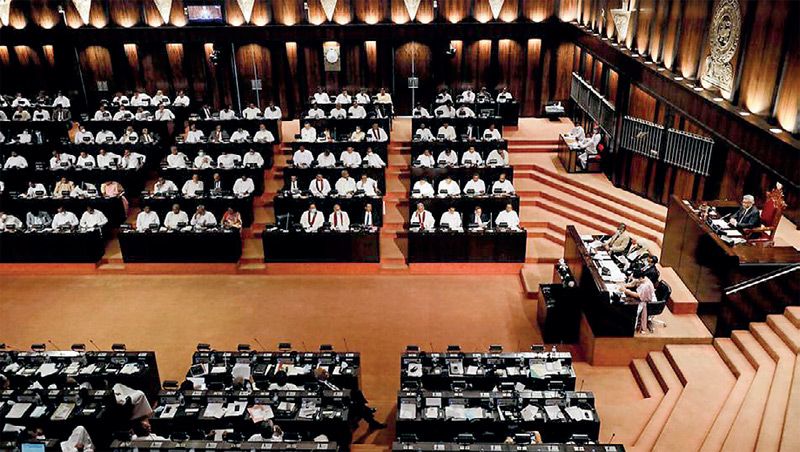Monday Feb 16, 2026
Monday Feb 16, 2026
Friday, 13 August 2021 02:49 - - {{hitsCtrl.values.hits}}

 A brief post published by me in social media with a questionnaire, proposing a methodology that can be adopted in selecting a suitable leader to steer Sri Lanka into a successful path, has become a subject of heated debate.
A brief post published by me in social media with a questionnaire, proposing a methodology that can be adopted in selecting a suitable leader to steer Sri Lanka into a successful path, has become a subject of heated debate.
In response Jaliya Darmasena had remarked that all the questions I had raised have been addressed by Nagananda Kodithuwakku in his policy statement. Samantha Liyanaarachchi had proposed that Ranil Wickremesinghe who is an experienced leader should be given the opportunity to rule the country. Ravi Jayewardene was of the view that Anura Kumara Dissanayake should be given the responsibility of governing the country.
Gayan de Silva had stated that, in practice, leaders like Sajith and Patali were seen to be an alternative to the Rajapaksas, and if they were not suitable, it should have been explained as to who could be the suitable alternatives. Senaka Amiyangoda has remarked that my proposal, though it sounds positive, would seem incomprehensible to the vast majority of the people and had made a request to point out a way out of the crisis in a manner that the people could understand easily. Taking into account the opinions expressed by all of them, I wish to submit my views for a program to overcome the crisis facing Sri Lanka.
No one will be excluded from the proposed program. It can be said that it would put both the old leaders as well as the potential new leaders into a test. And it will function as a mechanism for building new leaders. Such a reform program, I believe, will lead to a great improvement in the political imagination of the society.
Here is the brief summary of the proposed methodology that can be applied to overcome the crisis facing the country and bring about a profound change. First of all, a broader coalition must be formed for this reform program. The coalition should include both the old and new political parties and various groups. There should be new leaders as well as old leaders in it. This broad collective should be represented by public organisations and public leaders as well. In the final analysis, this coalition should be a great amalgam of all social groups in the country: ethnic, religious, cultural, linguistic, sexual and occupational. In other words, it should be a great national unity encompassing a wider cross-section of the society.
The philosophy behind the transformation
This national unity should have a democratic organisational structure and a practical program to recover the country from the crisis it is facing so that all important aspects of the country that have collapsed could be restored and developed in a formal manner, while at the same time building a democratic country in its proper perspective where the rule of law prevails in its true sense. It should be a program consisting of two stages. The period up to the next election can be considered as the first stage and the post-election period as the second stage.
The task of the first stage would be to prepare the ground for necessary reforms to rescue the country from the present crisis and to develop an advanced system. The proposed program should have an interim Constitution specifically signifying the functions of the first and the second stages including a time frame and the composition and powers of the Constitutional Assembly that will oversee the functions of the first and second phases. The tasks to be included in the first stage are as follows:
1. Initiate negotiations with the International Monetary Fund (IMF) to secure financial assistance and facilities required to resolve the balance of payments crisis and pursue its cooperation.
2. Introduce a methodology to look into the losses incurred by individual entrepreneurs, small scale businessmen and offer them a helping hand to restore their businesses.
3. Identify the fundamental measures needed to build the nation and implement them so that the fragmentation and breakdown of the social system would be healed.
4. Take necessary steps to rectify the imbalance in the three major power centres of the State (Legislature, Executive and Judiciary). (a) Bring the Head of State under the rule of law and for that purpose, entrust the judiciary with powers to nullify any illegal act that might be committed by the Head of State. (b) Grant the power of review to the judiciary (c) Make reforms with the assistance of the Judiciary to overcome the decline of the judicial system. (d) Take necessary measures to obstruct the possibility of the Head of State or Members of Parliament misappropriating public property and transacting business with the Government collectively or singly. (e) Cut down the unreasonable expenses incurred in maintaining the politicians.
5. Introduce reforms to make the electoral system free and fair and transparent. (a) Grant the powers to the Audit Commission and the Election Commission to inspect political party funds, election funds of parties and individuals. (b) Imposition of restrictions on election expenses. (c) Granting the powers to the Election Commission to enact laws and provide guidance to the political parties in order to ensure that the internal democracy in the political parties is maintained within the accepted standards.
6. Make necessary reforms to bring the media, media institutions and journalists into a level where they perform with a sense of social responsibility.
7. Review the foreign policy of Sri Lanka
The main features of the program
The authority on the first phase of the reform program should rest on the Constitutional Assembly which consists of all Members of Parliament and Representatives of the public whose number should not be less than that of the Members of Parliament. A suitable system can be chosen from several methods employed by the countries which had implemented the system of participatory constitution making in electing public representatives.
According to international law, when a country is in a crisis of this magnitude, the people who own the sovereignty are entitled to intervene in a direct democratic manner to resolve the crisis. The public has the right to demand for adopting a Participatory Constitution to facilitate necessary reforms; and it is the responsibility of the government to prepare an appropriate framework for that.
The public also has the right to bargain for that framework. The people, the public organisations and political parties of Sri Lanka should study this provision outlined in the international law which has the approval of the United Nations, comprehensively and focus on making the most of it.
After completing the first phase, the General Election or Elections will be held and, if necessary, it may be possible to reach a consensus on forming an all-party government for a period of five years, as was done in South Africa. This possibility too, must be included in the Transitional Constitution. Accordingly, after the General Election or Elections, the all-party government will be formed under the leadership of the leader of the political party which has secured the highest number of seats.
The principles on which the cabinet ministries should be allocated could be specified in the Transitional Constitution. After the election, the old Members of Parliament should leave the Constitutional Assembly and the newly elected Members of Parliament should join the Legislature. The people’s representatives of the Constitutional Assembly, if necessary, could be selected by an election.
Power to the people
The Constitutional Assembly should implement all reforms included in the Transitional Constitution such as making of a Constitution, formulation of national policies and reforms programs in the spheres of education, public health, transportation, energy, environment, agriculture, fisheries, industries and trade, etc.
The new Constitution should be formulated in such a way that it will not restrict the sovereignty of the people to a simple exercise of voting in elections only, but allows them to make direct democratic interventions with the participation of a large number of people as specified by the law, at times when their intervention is necessary in the sphere of governance.
A methodology that grants the public the right to submit a no-confidence motion against corrupt government officials when the law is not imposed on them or any other proposal that is useful for the country should be incorporated in the Constitution itself. Systems such as the ‘Popular Initiative’ and ‘Alternative Referendum’ practiced in Switzerland and several other countries can be taken into consideration in this regard. This will undoubtedly serve as a measure that will strengthen the active public involvement in the matters of governance.